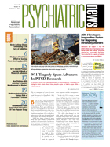Which comes first, schizophrenia or toxoplasmosis? Recent work makes clearer the possibility that infection with the protozoan parasite can be a precursor to schizophrenia spectrum disorders.
The association between Toxoplasma gondii infection and schizophrenia has been known since the first studies were published in the mid-1950s. And a 2008 study of U.S. military personnel showed an association between T. gondii immunoglobulin G (IgG) antibody level and schizophrenia. But the retrospective nature of those early studies begged the question of whether incipient psychiatric illness causes behavioral changes that increase the risk of infection with T. gondii, which then might explain that association, and the military study has never been replicated until now. The need for a prospective cohort study assessing T. gondii in adults prior to onset of psychiatric illness was recently addressed by a group of researchers at the National Center for Register-Based Research at Aarhus University in Denmark and the Statens Serum Institut, Artillerivej, Copenhagen.
Lead author Marianne Giørtz Pedersen, M.Sc., and her colleagues discussed in the August American Journal of Psychiatry limitations of previous studies, most notably that antibody levels for individuals with schizophrenia, in the earliest studies, were measured at the time of diagnosis. They designed a study to determine whether mothers infected with T. gondii have an elevated risk of schizophrenia or related disorders and whether the risk depends on IgG antibody level.
They performed a register-based prospective cohort study of 45,609 women born in Denmark in which the level of T. gondii-specific IgG antibodies was measured in connection with childbirth between 1992 and 1995. Enzyme immunoassay for T. gondii IgG antibodies was performed on heel-stick blood samples drawn from the babies within five to 10 days after birth. The level of antibodies was expressed as a percentage of the optical density obtained for World Health Organization international standard serum. Mothers of children with an IgG level above 24 were regarded as T. gondii-positive from the time of delivery. The IgG antibodies measured in the blood from the child were maternal in origin, as IgG passes through the placenta and infected newborn children will begin producing T. gondii-specific IgG at approximately only three months of age. The women were followed up from the date of delivery until 2008.
Eighty of those mothers developed schizophrenia during the 691,394 person-years of follow-up, a crude incidence rate of 1.15 per 10,000 person-years at risk. For mothers with the highest IgG level, the relative risk of schizophrenia spectrum disorder was 1.73 times higher than for those with the lowest IgG level.
"We found a significantly elevated risk of schizophrenia spectrum disorders associated with T. gondii infection," wrote Pedersen and her colleagues. "The greater risk was not explained by psychiatric family history, degree of urbanization at place of residence, or age at delivery."
The authors mention several possible theories explaining this observed association, but admit that all possible explanations remain speculative. "Further knowledge is needed about the potential differential effects of different strains and stages of T. gondii," they wrote.
In an editorial in the same issue, Alan Brown, M.D., M.P.H., a professor of clinical psychiatry and clinical epidemiology at the College of Physicians and Surgeons of Columbia University, New York State Psychiatric Institute, and the Joseph L. Mailman School of Public Health, hailed the work of Pederson and colleagues, saying the study featured notable strengths, including analysis of prospectively acquired data, the population-based sample, and the large number of pregnancies. "Studies that prospectively evaluate the relationship between this infection before diagnosis of schizophrenia and the risk of developing schizophrenia may help clarify the nature of this relationship," he wrote.
Brown also discussed another study reported in the issue by K.M. Prasad and colleagues, which assessed the relationship between herpes simplex virus type 1 (HSV1) seropositivity, longitudinal changes in gray-matter volume, and cognitive performance in first-episode, antipsychotic-naïve patients with schizophrenia and healthy comparison subjects at baseline and over a one-year period. "In both studies, active central nervous system infection is unlikely to have been responsible for the pathogenic outcomes given that the serologic evidence was based solely on IgG antibody, which most likely reflects infections at some point in the past.... Hence, alterations of brain functioning are most likely related to latent infections."
Brown said both publications added to the body of literature suggesting that environmental exposures may play a more important role in the etiopathogenesis of schizophrenia than has been previously assumed, shedding hope on new options because "many infectious exposures and other environmental insults are treatable and preventable."
The study was supported by a grant from the Stanley Medical Research Institute.

